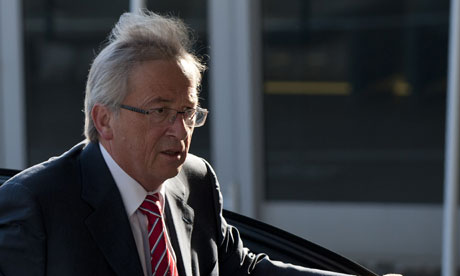
Eurozone finance ministers have put off until next month any decision to give the green light for a further €8bn bailout for Greece despite recognising that the Athens government had made some considerable progress in slashing the country's debts.
Jean-Claude Juncker, Eurogroup chairman, repeatedly made plain early on Tuesday that none of the eurozone countries was urging a Greek default and categorically denied that there was any question of Greece leaving the euro area.
In a move certain to disappoint markets, the 17 finance ministers sent signals they had no intention of agreeing to reboot the zone's rescue fund of €440bn closer to the €2tn or more demanded by leading investors and analysts. EU officials reiterated that there was "no Plan B".
But Juncker and Olli Rehn, the EU economic and monetary affairs commissioner, indicated that ministers had for the first time discussed measures to improve the bailout fund's efficiency and effectiveness in order to raise its firepower – code for raising the guarantees it needs for buying up more government bonds in the secondary market. Juncker said: "We consider that we should by no means increase the fund's financial volume."
He dropped a broad hint that private bondholders would be forced to pay more than the 21% "haircut" agreed at the 21 July meeting that increased the fund's volume and approved the second €109bn bailout for Greece – ascribing that to "technical" reasons.
Juncker and Rehn recognised Greece had made strides towards overcoming its debts and budget deficit but said that the Athens government had to be stricter about structural reforms and more ambitious in implementing privatisations.
It emerged that the ministers will be asked to approve the fresh €8bn aid as late as at a new meeting on 13 November once inspectors from the troika of European commission, European Central Bank and IMF have given their latest – and delayed – progress report on compliance. Juncker insisted that Greece could meet all its financial obligations – and suggested the new tranche of aid would be paid out in November.
After the Greek cabinet sent the euro and stock markets plunging on Monday by admitting on Sunday the country would not meet its target budget deficit this year or next, Evangelos Venizelos, had sought to win favours by insisting that the new budget was "very ambitious".
Entering Monday night's talks, he declared that the intention was to present "for the first time after many years" a primary surplus of €3.2bn next year compared with a deficit of €29bn only two years ago. He said the fiscal consolidation had been "very strong and very fast."
On Sunday Greece said its deficit would be 8.5% of GDP this year compared with a target of 7.6% and 6.8% in 2012 compared with a target of 6.5% but Venizelos insisted it had taken "all the necessary and difficult measures to fulfil its obligations".
He said: "Greece is a country with structural difficulties but Greece is not the scapegoat of the eurozone." Even so, anxieties about a Greek default sent the euro to a 10-year low against the yen and a nine-month low against the US dollar.
The French president, Nicolas Sarkozy, meanwhile said he would meet the German chancellor, Angela Merkel, in Berlin on Sunday for talks on "ways and means to accelerate the economic integration of the eurozone economy".
Ostensibly, the eurozone's two most powerful political figures are preparing the way for the crucial summit of the 17 member countries that will take place on 18 October or a day after a summit of all 27 EU countries, including the UK.
But the talks are bound to raise market hopes that the pair will come up with an outline plan for substantially increasing the scope of the European financial stability facility (EFSF) that can be put to the eurozone summit without necessarily boosting its funds. Slovakia assured ministers that its parliament would endorse the enhanced EFSF by 14 October.
Christian Noyer, Bank of France governor, indicated he was open to a scheme that would allow the EFSF to be leveraged – most likely by increasing the guarantees it can rely on to buy up more bonds and make bigger precautionary loans to countries suspected of being in trouble.
The Guardian
hostgator coupon 2011
No comments:
Post a Comment